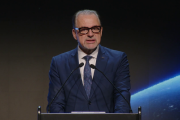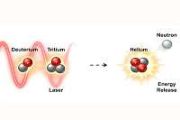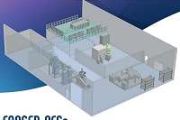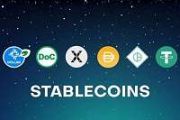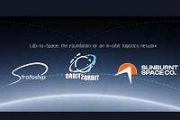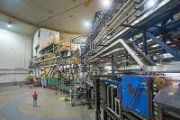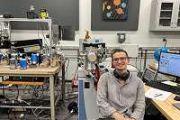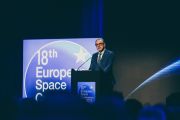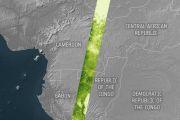
Copernical Team
Viasat to provide advanced network orchestration for Defense Innovation Unit's Autonomous Systems
 Viasat, Inc. (NASDAQ: VSAT), a leading global provider of satellite communications, has been chosen by the Defense Innovation Unit (DIU) to supply resilient networking solutions for the Replicator initiative. This program is focused on delivering autonomous systems designed to support warfighter operations with advanced command and control (C2) capabilities. The initiative is a key part of the U
Viasat, Inc. (NASDAQ: VSAT), a leading global provider of satellite communications, has been chosen by the Defense Innovation Unit (DIU) to supply resilient networking solutions for the Replicator initiative. This program is focused on delivering autonomous systems designed to support warfighter operations with advanced command and control (C2) capabilities. The initiative is a key part of the U York Space Systems delivers key milestones in satellite programs
 York Space Systems (York), a Denver-based aerospace company specializing in delivering complete space mission solutions, continues to establish itself as a leading provider for both government and commercial clients. Over the past several weeks, the company has achieved multiple engineering and operational milestones across two critical programs, showcasing its ability to scale production and en
York Space Systems (York), a Denver-based aerospace company specializing in delivering complete space mission solutions, continues to establish itself as a leading provider for both government and commercial clients. Over the past several weeks, the company has achieved multiple engineering and operational milestones across two critical programs, showcasing its ability to scale production and en First results from 2021 rocket launch shed light on aurora's birth
 Newly published results from a 2021 experiment led by a University of Alaska Fairbanks scientist have begun to reveal the particle-level processes that create the type of auroras that dance rapidly across the sky.
The Kinetic-scale Energy and momentum Transport experiment - KiNET-X - lifted off from NASA's Wallops Flight Facility in Virginia on May 16, 2021, in the final minutes of the fin
Newly published results from a 2021 experiment led by a University of Alaska Fairbanks scientist have begun to reveal the particle-level processes that create the type of auroras that dance rapidly across the sky.
The Kinetic-scale Energy and momentum Transport experiment - KiNET-X - lifted off from NASA's Wallops Flight Facility in Virginia on May 16, 2021, in the final minutes of the fin Space Flight Laboratory confirms launch and deployment of HawkEye 360 Cluster 11
 Space Flight Laboratory (SFL) has announced the successful launch and deployment of HawkEye 360's Cluster 11, marking a significant milestone in its collaboration with the Virginia-based company. The three-satellite cluster, developed under SFL's Flex Production Program, was integrated by HawkEye 360 at its facility and launched into sun-synchronous orbit on December 21, 2024, from Vandenberg Sp
Space Flight Laboratory (SFL) has announced the successful launch and deployment of HawkEye 360's Cluster 11, marking a significant milestone in its collaboration with the Virginia-based company. The three-satellite cluster, developed under SFL's Flex Production Program, was integrated by HawkEye 360 at its facility and launched into sun-synchronous orbit on December 21, 2024, from Vandenberg Sp XBow Systems expands defense contract for hypersonic solid rocket motors
 X-Bow Systems Inc. (X-Bow), a key innovator in solid rocket motor (SRM) production and defense technology, has announced an expansion of its U.S. Department of Defense contract to supply large SRMs to the U.S. Navy and Army. This development further positions X-Bow as a critical supplier in bolstering the national defense supply chain during a strategically important time for the United States.
X-Bow Systems Inc. (X-Bow), a key innovator in solid rocket motor (SRM) production and defense technology, has announced an expansion of its U.S. Department of Defense contract to supply large SRMs to the U.S. Navy and Army. This development further positions X-Bow as a critical supplier in bolstering the national defense supply chain during a strategically important time for the United States. True Anomaly deploys Jackal spacecraft on Mission X-2
 True Anomaly Inc., a leading defense technology company specializing in advanced space superiority systems, has confirmed the successful launch and operational control of its Jackal spacecraft. This milestone marks a significant step forward for the company, coming nine months after the inaugural flight test of the Jackal Autonomous Orbital Vehicle (AOV). The spacecraft was deployed into orbit d
True Anomaly Inc., a leading defense technology company specializing in advanced space superiority systems, has confirmed the successful launch and operational control of its Jackal spacecraft. This milestone marks a significant step forward for the company, coming nine months after the inaugural flight test of the Jackal Autonomous Orbital Vehicle (AOV). The spacecraft was deployed into orbit d SpaceX set to hold final launch on New Year's Eve after delay
 In what is expected to be SpaceX's final launch in a record-breaking 2024, the company announced it had delayed its newest deployment of Starlink satellites to New Year's Eve.
The launch, which was slated for early Monday, was scrubbed and rescheduled for Tuesday at 12:34 a.m. EST from the Kennedy Space Center in Florida. SpaceX said the launch window would be open until 1:28 a.m.
In what is expected to be SpaceX's final launch in a record-breaking 2024, the company announced it had delayed its newest deployment of Starlink satellites to New Year's Eve.
The launch, which was slated for early Monday, was scrubbed and rescheduled for Tuesday at 12:34 a.m. EST from the Kennedy Space Center in Florida. SpaceX said the launch window would be open until 1:28 a.m. India rocket launches space docking mission
This request seems a bit unusual, so we need to confirm that you're human. Please press and hold the button until it turns completely green. Thank you for your cooperation!
Press and hold the button
If you believe this is an error, please contact our support team.
185.132.36.159 : ab20ca7d-770e-4afb-b01b-77279b2b
SpaceX winds down 2024 with a pair of Falcon 9 launches
 SpaceX completed back-to-back missions of two Falcon 9 rockets over the weekend, delivering 22 Starlink satellites and Astranis's One to Many Mission into orbit, the 132nd and 133rd missions of the year.
"We're now targeting 134 launches - two shy of our last goal - to finish 2024 strong," Kiko Dontchev, SpaceX's vice president of launch wrote on social media. "Here's to an awesome la
SpaceX completed back-to-back missions of two Falcon 9 rockets over the weekend, delivering 22 Starlink satellites and Astranis's One to Many Mission into orbit, the 132nd and 133rd missions of the year.
"We're now targeting 134 launches - two shy of our last goal - to finish 2024 strong," Kiko Dontchev, SpaceX's vice president of launch wrote on social media. "Here's to an awesome la Teledyne selected as prime contractor for key sensor on LISA Space Observatory
 Teledyne Space Imaging has secured the role of Prime Contractor for the Constellation Acquisition Sensor (CAS) instrument, a critical component of the European Space Agency's (ESA) Laser Interferometer Space Antenna (LISA) mission. Teledyne will supply six CIS220 detectors and control electronics, leveraging its advanced detector and electronics technology. This effort is in collaboration with T
Teledyne Space Imaging has secured the role of Prime Contractor for the Constellation Acquisition Sensor (CAS) instrument, a critical component of the European Space Agency's (ESA) Laser Interferometer Space Antenna (LISA) mission. Teledyne will supply six CIS220 detectors and control electronics, leveraging its advanced detector and electronics technology. This effort is in collaboration with T 




